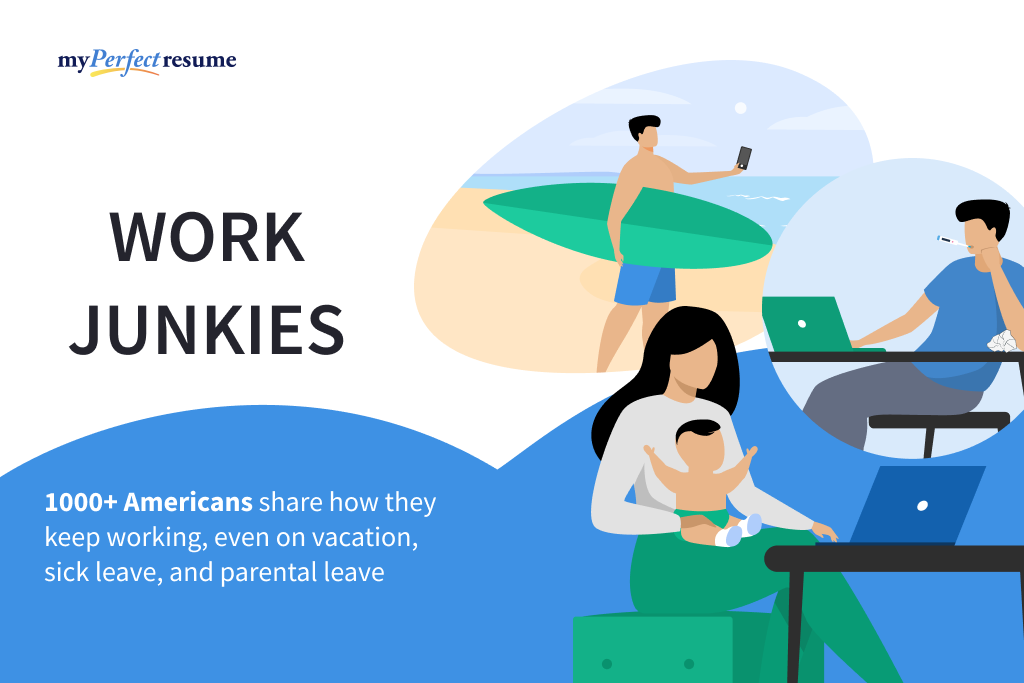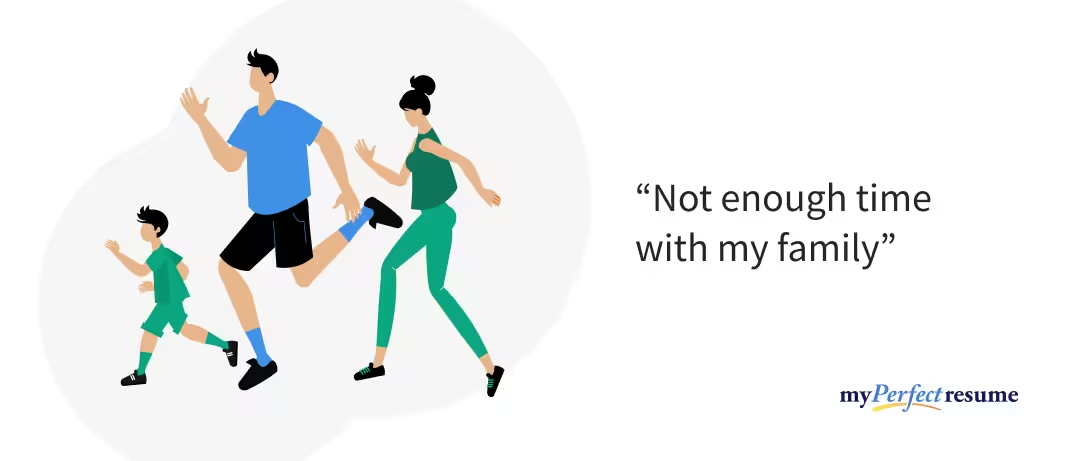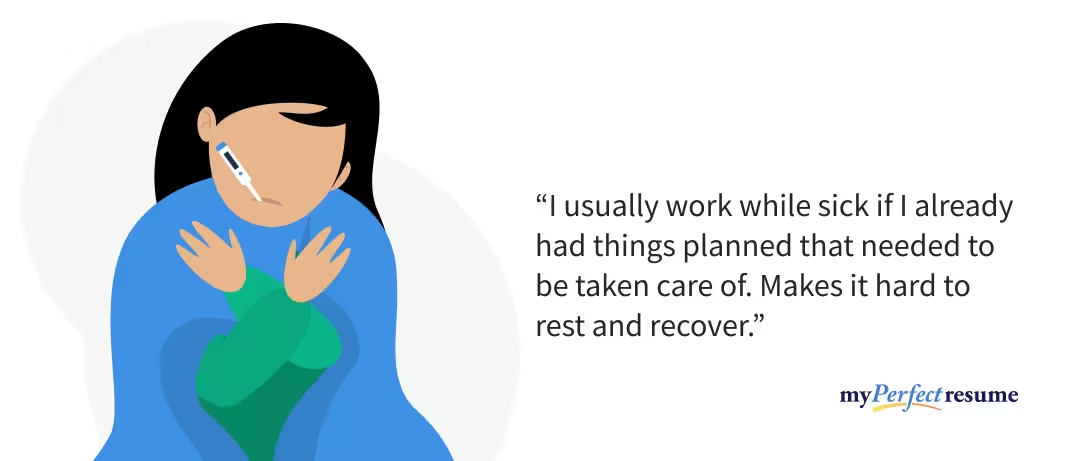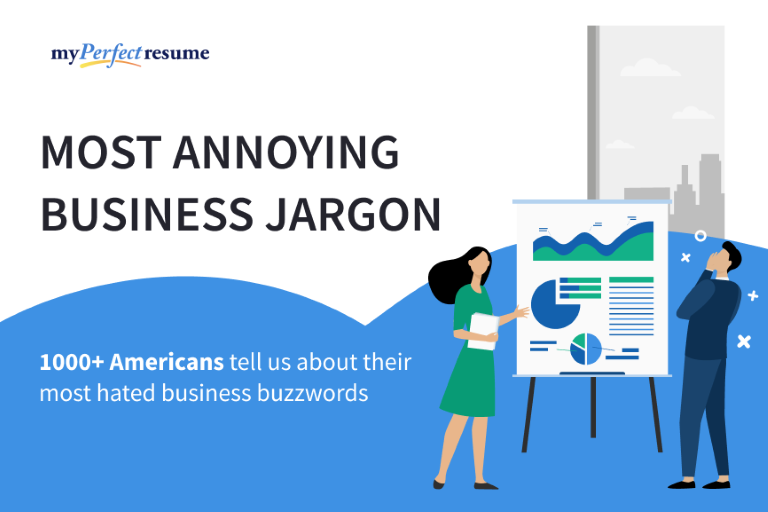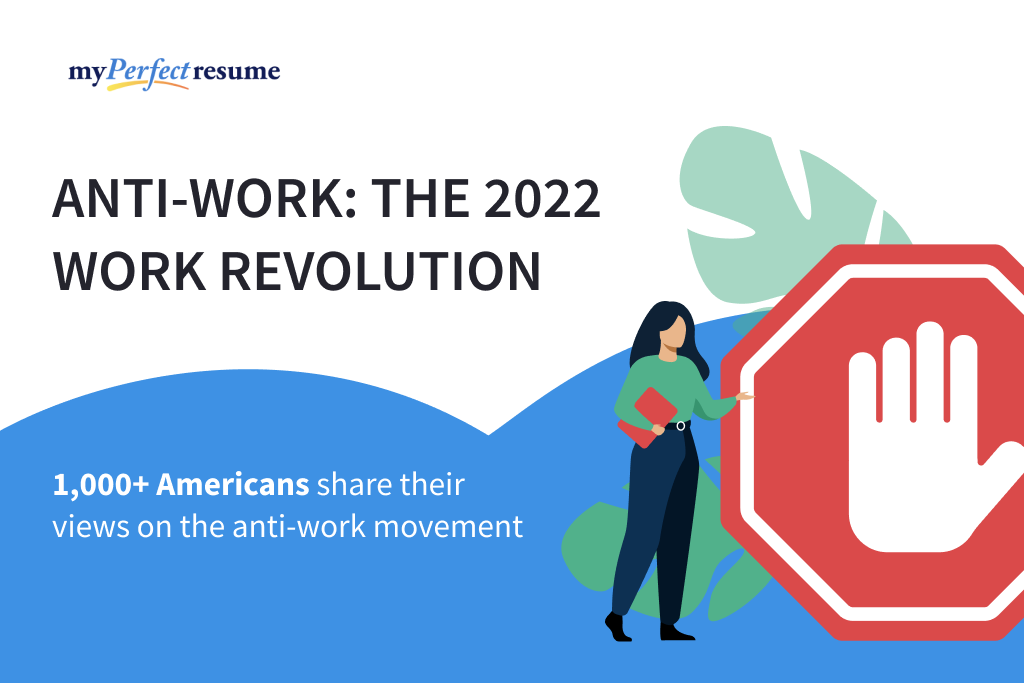Work Junkies—Why We Can’t Switch Off [2021 Study]
MyPerfectResume.com [February 21, 2023],
[https://www.myperfectresume.com/career-center/careers/basics/work-junkies]

Our customers have been hired at: *Foot Note
You know how it is. You took a vacation day and decide to head to your favorite café. Then, as if it knows you’re just settling down to relax, your work email notification pops up.
You came here to get a caffeine fix, but you're craving to check your work email is just as potent. You fight the compulsion to check it, but the urge is too great.
You hear the alluring whisper, Opennn meeee.
Swipe. Click.
Now, you’re switched on again. Back in the saddle.
Workaholism, workism, hustle culture—all of these catchphrases come back to the fact that we just can’t tear ourselves away from work. Our study shows just how much.
It seems our collective minds have become hardwired to feel obliged to answer work queries and even attend to work tasks when sunbathing, lying in bed with a fever, and even while breastfeeding. An addiction to being in the loop.
The data team at MyPerfectResume wanted to get to the bottom of how often our U.S. employees worked during days off, why on earth they did, and find out if it impacted their well-being.
Some golden, but sad nuggets that came out of our study:
- 82% work while on vacation
- 75% of survey takers worked on parental leave
- 70% answer calls from clients or colleagues on vacation
- 42% take vacation days specifically to do work
- 40% of respondents worked on sick leave
- 37% work on vacation because they “just like to be on top of things”
Make a resume with MyPerfectResume
Our Resume builder can help you write the perfect resume. Start Now!
Missing the Boat on Vacation
Whether canoeing down New Mexico’s Red River, taking a stroll with gorillas in Rwanda, or being extremely ordinary and sunbathing on your local beach with a cooler of brewskies—
Vacation should be sacred.
Our hard-earned vacations are meant to recharge our batteries, give us overworked Americans a respite and chance to spend time with family and friends. They’re opportunities to step away from our duties, which means switching off our work notifications.
Yet—we don’t.
As you can see, this isn't some hardcore workaholic minority. Turns out the vast majority of us are working when we're supposed to be catching some rays.
- 82% of our respondents have worked on vacation.
- 87% of respondents answered questions from coworkers while on vacation.
- 87% checked work emails and messages while on vacation.
- 78% has answered a phone call from their boss during vacation
- Our respondents also picked up calls from clients and colleagues—70% did so.
It turns out that if working on vacation were a crime, most of our respondents are serial offenders.
- 42%—worked on vacation 2-3 times
- 30%—4-5 times
- 13%—10 times or more
- 11%—6-7 times
- 4%—1 time
- 2%—8-9 times
We then dug into the demographics of who worked on vacation the most.
Yes—an astounding 9 out of 10 women said they check their work messages and 8 out of 10 men do so.
We asked, “Do you usually answer work-related questions when a coworker (not your boss) sends you a message on vacation?”
There was a significant difference between age groups.
- 91% of those 38 or older answer work-related questions from coworkers during vacation vs. 81% of those under 38 years of age
It seems clear that Americans work way too much, sacrificing much-needed rest to stay connected. But what are the consequences of not getting enough break time?
Pick a template and build your resume in a few easy steps.
All Work and No Play
Taking breaks shouldn’t be seen as a luxury. This is a right and one which should be taken advantage of.
Believe it or not, you’re more productive at work if you unplug and do something fun or relaxing. When the demands from work are removed, employees can recharge their psychological resources. Their physical and mental well-being is restored. Which means employees’ performance and attention/focus are more energized.
Apparently, workplaces are pressuring employees to work on vacation as a significant number of employees cited this as the reason they skipped relaxing for laptop time.
Many of our respondents felt that working on vacation had a negative impact on their lives. We asked, “What was the main negative impact?”
- 39% said that missing time to relax/have fun was the main negative impact
- Then there was a near tie between missing time with family at 25% and added stress at 26%
There was also a gender difference in the stress caused by working on vacation—29% of the women in our study felt that working on vacation caused added stress vs. 23% of men.
One respondent’s personal response summarizes the ill effects of working on vacation:
We also recommend reading up on how to write a good resignation letter to learn how to write this important document. Missing out on vacation time is one thing, but working when your health is on the line is another. We wanted to find out if those in our study were putting health first or stressing themselves out by working on sick leave.
Working—In Sickness and in Health
The thermometer says you’ve got a fever. Your body’s demanding rest and tea with honey.
Naturally, your laptop is within arm’s reach—relying on it as a source of distraction and well wishes from friends and family. But, it’s also a portal to the work sphere.
You’re just a teensy bit curious to find out if Mario from Accounting finally got back to you about the pricing issue that’s confounded you for a couple of weeks. You find yourself thinking you’ll just take a tiny peek.
Next thing you know, you’re drafting messages, tidying up loose ends, telling yourself it’s just so you won’t have a big pile waiting for you when you come back.
- 40% of those in our survey had worked when on sick leave
Those who were younger worked less on sick leave—37% of those age 39 and younger worked on sick leave, compared to 42% of those over 39 years of age.
No matter the age, Americans are not prioritizing their health, as can be seen below:
It’s clear that working while sick is rampant.
We must be married to our jobs. Why else would so many take care of business while ill? Working when feeling ill is not the path to recovery; in fact it’s quite the opposite.
The Symptoms of Working While Sick
Emails cause stress. Focusing on tasks causes stress.
Stress = not getting better. Stress means you’ll most likely suffer from more illnesses.
We wanted to know how our survey takers fared due to working while sick.
Sadly, 56% said they felt that working while on sick leave had a negative effect on their health.
What was this negative effect? Mainly stress, which was the main reason for 45% of respondents.
- Unfortunately, 21% reported that their condition had actually worsened due to working while on sick leave.
We’re working so hard that burnout has become classified as a syndrome in the World Health Organization’s International Classification of Diseases.
Burnout is defined as a syndrome which results from chronic workplace stress that hasn’t been successfully managed.
They identify these burnout symptoms:
- Feeling exhausted
- Having apathetic or negative feelings about one’s job
- Being less effective professionally
According to a pre-pandemic survey from Gallup, about two-thirds of employees felt burnout symptoms, and just under a quarter said they felt them very often or always. And these figures were taken before the COVID-19 pandemic.
But since then, our great social experiment of working from home has caused an increase in burnout symptoms.
That percentage is up from 45% in the early days of the pandemic, as stated by the 2020 Eagle Hill Consulting COVID-19 Employee Burnout Survey. Among employees who reported burnout, 35 percent pointed to pandemic circumstances as the source.
After so many months of dealing with social isolation, education disruptions, the fuzzy line between work and home, and layoffs of family members, it’s no surprise that burnout is rampant.
Time for our family and friends, to relax, to switch off are sorely needed.
New parents are arguably the ones who shouldn’t be expected to focus on work. We wanted to determine if this was the case.
Babe (and Phone) in the Arms
There are so many precious moments with a new baby. Every day brings something new.
Many of our survey takers—34%—had gone on maternity or paternity leave.
But time with their newborns was interrupted by attending to work. One disturbing effect of this work was that many parents had actually missed out on some of their babies’ firsts.
Unfortunately, 37% of those who took our poll missed their baby’s milestone due to working.
Nothing like missing your bundle of joy’s first smile because you were checking a spreadsheet for a deadline, while on parental leave. Joining the work force again after maternity leave? Check out our guide on how to write the perfect cover letter after maternity leave.
We crossed our fingers that the following question would yield a resounding NO, but the response made us cringe and left us thinking bosses were not as respectful as they should have been.
When we asked, “Did your boss contact you when you were on parental leave to do work?”
Three quarters of them (75%), said yes.
Then for those who answered yes we asked, “How did you react to your boss contacting you when you were on parental leave to do work?”
Here’s what they told us:
- 45%— I was glad my boss wanted my help
- 24%— I didn’t mind/I understood
- 14%— I cried
- 11%— I was angry
- 6%— I wanted to quit
Essentially, nearly half of those in our study who took parental leave were happy to help their boss while on parental leave. This left us scratching our heads, but it seems to point to our impulse to work all the time.
But—
This didn’t take away the fact that there were many who found working while on parental leave to be a huge burden.
We asked those in our study about their experiences and many moms shared about how difficult it was to do work tasks while trying to care for their baby.
Here are a couple of examples.
So, we ascertained that our respondents actually felt compelled to work while on parental leave.
We desperately wanted to know the “why” behind our respondents’ compulsion to work regardless of being off.
What Was the Motivation?
We needed to know the main reason our respondents were working when they should have been resting.
Despite the fact that, or maybe due to the fact that our typical 10-15 vacation days are minimal, we have no guaranteed paid sick time or paid maternity leave, working on days off is commonplace.
Also, as remote work has become the norm for so many, the lines are blurred between in-and out-of-office. All our digital tools means we have quick responses and increased flexibility, but it’s created a constant switched-on culture.
We can be reached 24/7. And, unfortunately, our employers are taking full advantage of the fact
We asked our respondents why they worked on vacation, on weekends/holidays, on sick leave, and during parental leave.
The overriding, majority response was—(drumroll, please!):
- 37% selected this as their reason for working on vacation
- 35% picked it for working on weekends and public holidays
- 30% clicked this option for working on parental leave
- 32% chose this as their reason for working on sick days
What does this tell us?
It comes back to what’s become like an instinct for us—being perennially switched on when we should be switched off.
To reiterate what can be seen in the infographic above, the series of “agree/disagree” questions uncovered the depth of our respondents’ drive to work when scheduled to be off.
Here are the main takeaways from our respondent’s opinions on this:
“I feel the need to know what’s going on at work when I’m on vacation.”
- 45% agreed
"An employee should always answer calls/messages from their boss, regardless of whether they’re on vacation or not.”
- 38% agreed
We decided to throw in an extreme statement to see if some had hardcore feelings about work ethic.
“Days off are a privilege, not a right.”
- 31% agreed
Surprisingly, three quarters of our survey takers believed employees shouldn’t be asked to do work when on vacation, nor on sick leave.
“Employees should not be asked to do work when they’re on vacation.”
- 75% agreed
“Employees should not be asked to do work when they’re on sick leave.”
- 79% agreed
And, vacation shaming is a thing.
“I have been vacation shamed by someone at work.”
- 37% agreed
Do we really “love” our jobs? Or are we being made to believe our work is what gives life meaning? We don’t know, but we wanted to find out if our workers felt they loved their job.
“I love my job.”
- 61% agreed
Sorry, but alcoholics love their drink, don’t they?
And, you know what’s another classic addiction symptom? Getting jittery when you can’t get the thing you’re jonesing for.
Half of our respondents said that they feel less anxious if they can take care of some work during vacation.
In Conclusion
You said it.
Our respondent, that is. We’re seriously overworking.
Addicts are well known for their justifications, and it seems we’ve got more justifications to click an email than we can shake a used heroin needle at.
If you’re lying on the beach soaking in the sun, the thought creeps in—
“Oh, I’ll just take a quick look at my email, just in case.”
Our 1000+ respondents were itching to work it seemed. Most worked despite being away, being ill, and tending to their newborns. They worked despite their overriding agreement that workers should be left alone on their days off.
But, why?
Psychotherapist Nancy Colier calls the need to click “Lottery Brain.” We’ve got this feeling like we’re going to win something. Like we’re at the slot machine. Somehow, all the junk email (non-winning bets) keeps us hooked, and we keep clicking, feeling like the next one will reveal something special—like recognition of good work that we did.
In another poll, 60% of respondents said that two hours was the amount of time that they didn't check emails during their day.
The desire to constantly check emails is a classic symptom of being work addicted.
Maybe we should all just go cold turkey and try to stay on the wagon? We need to get that work monkey off our backs.
Methodology
We surveyed 1,012 respondents online via a bespoke polling tool on their experiences with working while on leave. All respondents included in the study passed an attention-check question. The study was created through several steps of research, crowdsourcing, and surveying.
Limitations
The data we are presenting relies on self-reports from respondents. Each person who took our survey read and responded to each question without any research administration or interference. There are many potential issues with self-reported data like selective memory, telescoping, attribution, or exaggeration.
Some questions and responses have been rephrased or condensed for clarity and ease of understanding for readers. In some cases, the percentages presented may not add up to 100 percent; depending on the case, this can be due to rounding, or due to being part of a larger statistic, or due to responses of "neither/uncertain/unknown" not being presented.
Fair Use Statement
Don't miss the chance to share these findings—–you might regret it! If you think your audience will be interested in this information, you can share it for noncommercial reuse. All we ask in return is that you link back to this page so that your readers can view the full study.
About Us
At MyPerfectResume, we recognize the challenges posed by work-life imbalance. We strive to support you in your efforts to find a job that allows for a harmonious professional and personal life. Review our extensive collection of resume samples (written by certified professional resume writers) and professional resume templates. Explore our resources and user-friendly resume maker to create a compelling resume that opens doors to opportunities, helping you regain balance and find fulfillment in both your career and personal endeavors.
How we reviewed this article
Since 2012, we have helped more than 11 million job seekers with our user-friendly tools and career advice articles. We have a rigorous editorial process to ensure that our content is helpful and accurate. Explore our recent employment studies and press coverage, and discover why our certified career experts are a trusted source for professionals worldwide.
Sources
- Anders, George, “Burnout signs have risen 33% in 2020; here are seven ways to reduce risks”
- Collier, Nancy, “Why We Are Addicted to Checking Email”
- Eagle Hill Consulting, “Employee Burnout from COVID-19 on the Rise, With 58% of U.S. Workers Reporting Burnout”
- Hannah Tiongson, “Hustle culture and toxic productivity are ruining your brain”
- https://www.theatlantic.com/ideas/archive/2019/02/religion-workism-making-americans-miserable/583441/
- Masciotra, David, “How America's 'Culture of Hustling' Is Dark and Empty”
- Ronald J. J. Burke, Cary L. Cooper, “Long Work Hours Culture: Causes, Consequences and Choices”
- Rosario, Isabella, “When The 'Hustle' Isn't Enough”
- Sussman, Steven, “Workaholism: A Review”
- Tabassum, Ayesha, Rahman, Tasnuva “Gaining the insight of workaholism, its nature and its outcome: A literature review”
- Thompson, Derek, “ Workism Is Making Americans Miserable”
- Woodyatt, Amy, “Long working hours are killing hundreds of thousands of people a year, WHO says”
Our customers have been hired at:*Foot Note

